#st analysis
Explore tagged Tumblr posts
Text
You can really tell how transgressive TOS Kirk and Spock's relationship is from the reflexive need of contemporary "remakes" to inject antagonism into it.
That friction and contention just flat-out isn't there in the original. Jim and Spock are just always listening to one another, and trying to understand each other(often succeeding), and admiring one another, and that makes SO MANY straight men deeply, Deeply Nervous.
#I'm looking at YOU JJ Abrams#Star Trek#Queer#ST: TOS#ST: AOS#James Kirk#Spock#Spirk#ST Analysis#zA Analysis#analytic posts#Transgressive Spirk
2K notes
·
View notes
Text
"...cause I love her and I CAN'T LOSE her AGAIN"
“I'm just trying to demonstrate how careless Max is with Eleven's powers. In fact, how careless all of you are. You're treating her like some kind of machine when she's not a machine, and I don't want her to die looking for the flayed when they've obviously vanished off the face of the Earth. So can we please just come up with a new plan because I love her and I can't lose her again.”
Mike’s most quoted line in Season 3 — “Because I love her and I can’t lose her again” — is often cited as definitive proof of his love for Eleven. But this statement, when viewed in full context, is a trauma response rather than a heartfelt romantic confession.
What’s hilarious is that the reason why he said that is literally in the sentence itself: the trauma. It’s ironic that this scene is being used as the ultimate proof, when in reality, it perfectly illustrates Mike’s core issue. The trauma of having watched her sacrifice herself to protect him, after he’d spent the entire first season urging her to use her powers (he literally said it in season 1 that she was a weapon). What pushed him to say this was the accumulation of all the unresolved trauma he experienced throughout Seasons 1 and 2—and that doesn’t exactly strengthen your argument, because…
The trauma begins in Season 1. Mike forms a fast, intense bond with Eleven while Will is missing. He projects his grief, fear, and protective instincts onto her.
Expanding upon the notion that trauma lies at the heart of Mike and Eleven's relationship, it's significant to note that the moment Mike kisses Eleven in Season 1 occurs on the very same day he effectively attempted suicide by leaping into the quarry—an act from which she rescued him. From that point forward, he perceives himself as entirely indebted to her. Not only had he already idealized her as his only hope of finding Will, but she now embodied the literal reason he was still alive. Layered atop this is the influence of those around him—Lucas, Dustin, and even Nancy—who had begun to suggest he harbored romantic feelings toward her. Combined with his own confused emotions, the pedestal upon which he placed her from the very beginning due to the almost mythic timing of her arrival in his life, it constructs what appears to be a perfect narrative. And as a Dungeon Master and an aspiring storyteller, Mike is especially susceptible to such emotionally charged, almost archetypal storylines. Within this context, it becomes entirely plausible that he would interpret his overwhelming emotions—rooted in trauma, gratitude, and projection—as romantic love. That this kiss occurred on the very day of a near-death experience he never references again (and may never have shared with anyone besides those present) underscores the depth of repression and denial involved. Fundamentally, their relationship is born out of mutual trauma and survivor’s guilt. It is a structure of codependency rather than genuine romantic affection. Personally, I believe that had Mike not jumped into the quarry, and had Eleven not saved him, he would not have kissed her that night.
From the moment Eleven disappears at the end of Season 1 after using her powers to save him and their friends, Mike internalizes guilt and blame. He had encouraged her to keep using her powers, to push herself, and to fight — and she seemingly died because of it. He urges her to use her powers repeatedly, culminating in her presumed death. For nearly a year, Mike believes she died because he pushed her too far, he grieved her, believing it was his fault. This established a psychological pattern of guilt and a compulsive need to protect her, not because of romantic love, but as a trauma response.
If he truly loved her romantically, he would’ve reacted with joy and emotional fulfillment at the end of Season 3, when El told him she heard what he said and that she loves him too. He would’ve kissed her back, smiled, said something, even if he was surprised. The truth of that scene is, ironically, a perfect summary of how Mike—his point of view and his emotions—is misunderstood by the other characters and also by the audience. Because he is incapable of truly communicating or expressing his emotions.
That scene is literally Mike breaking down in a full-blown panic, triggered by his unresolved trauma: the fear of loss and abandonment caused by Will’s disappearance in Season 1, El’s absence and presumed death in Season 2, the helplessness of watching Will be possessed and nearly die, the massacre at the lab (gosh let’s be honest, Michael Wheeler urgently needs therapy, I did a post cut in two part : here and here who develop more and where I was already mentioning how this scene says a lot about Mike mental health), and finally, his survivor’s guilt for having encouraged El to use her powers to the point where she “died” right before his powerless eyes. This scenario is a mirror of Season 1's climax, and Mike’s panic reveals a deep-rooted fear of repeating past events.
For a whole year, he believed he was the reason El was dead. And the very argument that triggered that line was literally about whether or not El should keep pushing herself and her powers to the limit to stop Billy—when she had already nearly died doing exactly that. So yes, when Mike says, "Because I love her and I CAN’T LOSE HER AGAIN," it's true. Because, breaking news: Mike does love El. He deeply cares about her. He feels the need to protect her. He carries immense guilt over what happened to her, which only amplifies his desperate need to protect her now and avoid repeating the same mistake that, in his eyes, led to her "death"—a death that felt absolutely real to him.
When faced with the possibility of losing El again in Season 3, Mike's fear resurfaces—not because he is madly in love, but because he cannot emotionally survive another loss for which he feels responsible (he is just 14 here remember). The panic in his voice, the overwhelming urgency of “I can’t lose her again,” reveals that it is not romantic love driving him—it is fear, shame, and unresolved grief. This is compounded by his lack of romantic follow-through when she returns. There is no joy, no emotional intimacy, no physical warmth. Instead, there is distance, awkwardness, and emotional shutdown.
But the real truth in that line isn’t even the “because I love her” part—because nothing in that moment confirms he's saying it romantically (especially since he can’t even say it to her face, can’t write it to her, and still can’t say it even after she confirmed that she loves him and heard him say it). So yes, he loves her, just like he loves Lucas, just like he loves Nancy, just like he loves Dustin.
What truly matters in that sentence is: “and I CAN’T lose her AGAIN.” And those are the words he emphasizes. Not “because I love her”—that part is rushed, buried in the flood of words he’s pouring out mid-panic. But he clearly articulates and stresses “and I CAN’T lose her AGAIN.”
Everything is shown here—not told—through his words, his body language, his tone, the context. His trauma is triggered. He’s terrified. He’s trying to prevent history from repeating itself, because the current situation feels too much like the Season 1 finale from his perspective.
So no, it wasn’t romantic love that drove him to say that. It was unresolved, ignored trauma being violently reactivated. The only difference lies in how people interpret that line—be it other characters or the audience—through the lens of heteronormativity, completely ignoring the full context and everything that follows in Mike’s behavior and attitude toward El.
It could’ve been cute, and could’ve worked in your favor—if the show had ended with that episode. But unfortunately, the Season 3 finale and the entirety of Season 4 only go on to confirm that yes, he loves her and he can’t lose her again, but he doesn’t love her romantically, and he is deeply traumatized and in need of healing from his abandonment and loss issues—or else Vecna’s going to have an easy time with him.
If Mike were truly in love with Eleven, one would expect expressions of that love to come naturally, especially in moments of emotional vulnerability. Yet, at the end of Season 3, when Eleven tells him she heard what he said and that she loves him too, Mike gives no response. He looks stunned, confused, almost empty. He does not affirm her words, kiss her back, or show any sign of romantic fulfillment. Mike’s behavior in these scenes doesn’t resemble a boy in love. It resembles a boy in distress, one who is playing a role he feels obligated to fulfill, but who cannot emotionally connect with that role.
This pattern continues in Season 4. He avoids writing “Love, Mike” (and write every time "From Mike" instead) in letters, despite knowing it’s what Eleven needs to hear. When confronted, he dodges and manipulates: “I say it”. But we, the audience (and El too), know that he doesn’t. His behavior is not that of a loving boyfriend, but of someone trapped in a role he doesn’t know how to escape from. His “I love you” speech in Volume 2 is prompted not by genuine passion, but by external pressure, specifically by Will’s emotionally charged metaphorical painting (that channels Will’s own feelings for him) and pep talk and his finally staged encouragement ("don't stop, remember, you are the heart ! You're the heart"). The words are performative, desperate, idealized—not grounded in emotional truth. He praises a version of Eleven that no really exists, emphasizing her strength and powers, not her vulnerability, her personality, or her heart. This suggests he is in love with the idea of her—an idea shaped by admiration, yes, but especially guilt and obligation, not affection (further alienating her and reinforcing that his attachment is conditional and performative).
So yes, if the only two times your boyfriend tells you he loves you are:
– once, when you're not physically present, and he says it in a panicked trauma response, then refuses to take ownership of those words afterwards,
– and the second time is only after you told him that never hearing it from him is hurting you, and you need to hear it—and instead of reassuring you, he gaslights you into thinking he says it when he clearly doesn’t, dodges the subject by idealizing you as a superhero…
…and this “I love you” only comes when you’re on the brink of death, and only because his best friend handed him a painting with a disguised declaration of love in it?
Then I’m sorry, but that’s not romance. That’s codependency, guilt, trauma, emotional repression, and societal expectations. Not romantic love.
The relationship between Mike and El has long been framed through a heteronormative lens, one that presumes emotional closeness between a boy and a girl must equate to romantic attraction. The show’s framing and marketing often push this narrative, but Mike’s behavior consistently subverts it. His discomfort with physical affection, his emotional volatility, and his failure to express romantic feelings — even when prompted — all suggest that this narrative is externally imposed, not internally felt.
The audience’s insistence on seeing “Because I love her and I can't lose her again” as a definitive romantic confession overlooks the complexity of Mike’s trauma, his guilt, and his emotional repression. It ignores the fact that he never says it to Eleven directly until forced to, and even then, it is with inauthentic language and shaky motivation. The tragedy is that Mike’s real love story — one rooted in slow-burn intimacy, shared vulnerability, and mutual understanding — is with Will. But because it doesn’t fit the traditional mold, it goes unacknowledged by both the characters and the audience.
Mike Wheeler is not a romantic lead blindly in love with Eleven. He is a traumatized boy burdened by guilt, struggling with self-identity, repressing his true feelings, and unconsciously projecting protectiveness as love. His actions toward Eleven are rooted in trauma, not desire, while his connection with Will reveals the kind of emotional intimacy that speaks to a deeper, romantic truth. Until Mike confronts his trauma and his sexuality, he will continue to play a role that does not align with who he truly is — a boy in love, not with the girl who saved him, but with the boy who always understood him.
Mike is not a character who lacks love—on the contrary, he feels deeply. But his emotional repression, unresolved trauma, and fear of loss lead him to confuse guilt with devotion, and obligation with romance. His relationship with Eleven is a product of circumstance and narrative expectation—but it lacks the emotional reciprocity, intimacy, and authenticity of true romantic love. Meanwhile, his emotional world orbits around Will, whose presence brings out the rawest, most vulnerable, and most honest version of Mike.
In truth, Mike doesn’t need a girlfriend—he needs healing. He needs to confront his guilt, allow himself to feel, and to stop hiding behind a version of love that doesn’t belong to him. Only then will he be able to understand what love really is—and who it’s truly for.
#stranger things#byler#mike wheeler#will byers#byler endgame#stranger things theory#stranger things analysis#mike wheeler analysis#byler tumblr#mike wheeler is gay#mileven#platonic mileven#el hopper#eleven hopper#el hopper byers#stranger things 1#stranger things 2#stranger things 3#stranger things 4#mike wheeler mental health#trauma#mental health#coping#love confessions#relationship#feelings#byler analysis#st analysis#character analysis#media analysis
191 notes
·
View notes
Text
Byler analysis
Ok so I was rewatching 4x09 and the one scene with the endgame couples came up and I noticed something.
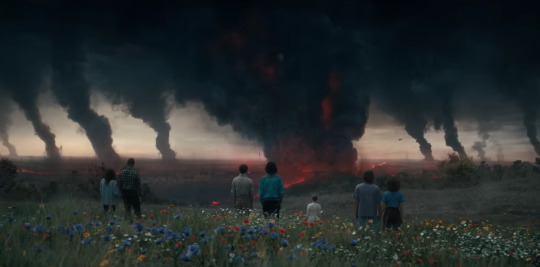

Ok so if you look at each couple, they are very clearly divided despite the expected blocking of a scene with this gravity. I’ll break down the divided sections below. ⬇️
Section one: Jopper
So the section where they are is what I would call the clearest. The air and horizon look the least contaminated and the ground in front of them only has smaller cracks. So if you look in the background of the section you can barely make out a tower that resembles a radio tower, I’ll explain the significance of this in a bit. So I would venture to say their relationship is already established, has few problems, and is not heavily involved with the supernatural plot (similar to season one). Section two: Byler
Their section is sitting directly in the middle of the shot and the largest rift, has a red looking horizon, has a heart with lightning on top of them (as does Jopper and I will explain this later as well), the ground in front of them seems very affected by the rifts. Despite them being in the middle of the biggest rift it barely divides them. They also have a radio tower in the distance, very clearly in the middle of them (probably the clearest one in the shot). Overall they are very close and have the least interference in the shot. This signifies to me that they are very crucial to the story, are involved in the supernatural plot quite a bit, their arc focuses around their relationship, and figuring out where they belong.
Section three: El
So her section is directly in the middle of the biggest plume of smoke and there is no clear horizon in her shot at all. The largest rift is directly in front of her, no radio tower in sight. Instead on her horizon is a gap in the smoke surrounded by and emitting red light. She is very clearly alone except that mike is barely in her section and very far away and Johnathan and Nancy are further into the section and closer by a little. To me this means that in season five she is going to be the main character in the supernatural plot, she is going to be dating Mike but very briefly before they both end it, and then she is going to rely heavily on platonic relationships this season.
Section four: Jancy
Theirs is interesting, in the section with their heads (that’s what I’m counting as their section) there are multiple rifts and smoke plumes, the destruction looks bad, there is a helicopter in the sky, and there is a radio tower in the distance. They are close to El so I don’t think they will be off in their own story line like season one but they will have a slightly separated storyline. The helicopter is right in front of the radio tower symbolizing an obstacle or something in their way. Steve, the helicopter represents Steve. The helicopter played a big part in helping me understand the symbolism in this shot. So I would say that they are very crucial to El and the others and they are struggling with their relationship.
Ok onto the other things.
Heart clouds:
The heart clouds represent 2 things. One is a change in the relationship, this means for Jopper and Byler their relationships will change. Why these two and not Jancy? Well let’s start with Jopper. Jopper is an established relationship and they are adults and we are going to have a time skip so it is logical to assume there will be a wedding. Also maybe a more mature change in their relationship. For Byler they have been friends the entire show, and logically ( if you are able to see very obvious subtext) they will end up dating by the end of the show. The heart represents this change in relationship from friends to dating. Jancy might breakup and their relationship might be bumpy and need repairs but overall their relationship will not change. I at least think that they will end the series by them going off to some college together and very happy. They have not had a significant chance in relationship. That is why only Jopper and Byler have the hearts. Two is the hearts also represent charged scenes between the characters since they both have lightning coming out but that’s not as important as the change in relationship.
Radio towers:
The radio towers, these really tipped me off and made me want to do this analysis. Ok so the radio towers represent a future or destination of some sort. (If you all have any better ideas of what they represent feel free to share!) they are clearly placed in front of Jopper, Byler, and Jancy. Though Jancy has the helicopter in front. These represent happy endings for the characters since they are an end point on the horizon. Now El doesn’t have one and here’s what I think that means.
El’s lack of a radio tower and what I think that means:
So, El is very obviously positioned in the biggest smoke column, which is where the upside down is bleeding into Hawkins. She doesn’t have a radio tower or even a clear horizon. This to me means that, sadly, she is foreshadowed to either not survive or be stuck in the upside down somehow. Since the radio towers represent a future/ destination and she only has something from the upside down in her section, that’s why this foreshadows that. And also what Mille said about see El’s ending.
That’s it!! Wow that was a lot of typing. Let me know if anything is off or if I should change anything. If I get a little repetitive, sorry!! I have a problem with that. If I need to elaborate on anything I totally will js ask!!!
#byler nation#mike wheeler#will byers#mileven is bones#byler analysis#byler parallels#stranger things#stranger things 5#stranger things analysis#stranger things theory#strangerthings#anti mileven#jancy#jancy endgame#jonathan byers#nancy wheeler#jopper#joyce byers#el hopper#jim hopper#el hopper byers#st analysis#blocking#byler#< target audience
198 notes
·
View notes
Text
Remembering how when I first watched stranger things (this was literally so long ago, omfg) in that scene where Mike is talking with Dustin about Lucas, Dustin says, "He's your best friend right?" And I just remember thinking,
'Lucas? It's obvious WILL is Mikes best friend'
But then, Mike agrees.
And now, with the context of byler, that just feels like one of the biggest OG proof. Mike's connection with Will is undeniably different from the rest of the party, even since the beginning.
#byler#stranger things#mike wheeler#will byers#lucas sinclair#dustin henderson#byler endgame#st5#stranger things 5#byler proof#byler analysis#st analysis
149 notes
·
View notes
Text


Ross Duffer has posted a couple of new images. In one of them, we see Disney's 1951 CANONIC Alice.
For those who don't remember or have forgotten what I said about this.
In some of the videos, we see Holly wearing something resembling very strongly, the original Alice dress.
I think that Henry has put Holly in a trance for his own purposes (which are not clear to me, personally, only speculation) and befriended her. He placates her by sending her, perhaps, to her favorite fairy tale.
It is at this point that Holly will probably get lost and the search for her will begin.
Holly Wheeler, will become the Alice in her own mind, in Henry's fairy tale.
#byler#byler endgame#finn wolfhard#mike wheeler#will byers#noah schnapp#stranger things 4#byler brainrot#stranger things 3#st5#stranger things analysis#stranger things 5#stranger things theory#stranger things#st analysis#byler s5#holly wheeler#henry creel#st5 leaks#st5 predictions#st5 speculation#stranger things s5#stranger things theories#st
515 notes
·
View notes
Text
"Prince" Mike Wheeler?
we know his coat of arms means a lot of things, but walk with me.

remember this?

well, there's something very important about bambi that i think we all forgot.
he's a prince!






don't know what this could mean yet exactly, but it's super interesting. all i'm saying is, he did kind of have that cliche "princely" proclamation of "love" by the end of the season. however, i'm wondering if there's much more to the very unofficial title than that.
92 notes
·
View notes
Text

this scene in st1 when karen is saying to mike “i want you to feel like you can talk to me, you don’t have to hide anything from me” she had no idea about the el plot line at this point… she was letting him know it’s safe to talk to her
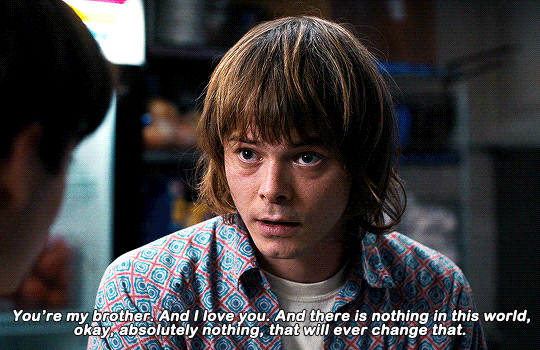
suspiciously like this scene from st4 when jonathan is hinting to will that he knows he’s gay and is comforting him and telling him he loves him no matter what and he’s “here to talk, now more than ever” ❤️❤️❤️
#stranger things#byler#stranger things parallels#st parallels#stranger things analysis#st analysis#byler analysis#byler parallels#byler brainrot#mike wheeler#will byers#byler endgame#mike wheeler is gay#jonathan byers#karen wheeler#into the ether#stranger things 1#st1#st#stranger things 4#st4#stranger things textposts#stranger things theory#st theory#stranger things gifs
225 notes
·
View notes
Text




The way this shot at the roller rink frames Mike & El under "Rental" while also drawing visual comparisons between Will and El: very similar shirt, similar height, similar haircut, and the actors have been instructed to hold the roller skates the same way while Mike holds his differently. The blocking practically demands that we the audience see El and Will as twins or somehow interchangeable. (Which, romantically, El is Will's stand-in, to Mike - the socially acceptable option that he can project upon because she began her social life as a mostly blank slate). This visual at the roller rink reminds me of the careful framing, now-famous among Bylers, of Mike in-the-closet while El kisses him. (She could easily back him in there and shut the door and he'd be like 🧍♂️🚪 ... lol.) The Duffers don't do everything right, but they (and others, Sean Levy amongst them I'm sure) are very skilled at building a narrative through blocking, background objects, lighting, and other visual and non-dialogue avenues.
#byler#byler analysis#cinematography#framing#blocking#stranger things#stranger things season 4#will byers#mike wheeler#stranger things analysis#byler tumblr#st analysis
196 notes
·
View notes
Text
Hello hello, nothing to see here!
Just the Tiger symbolism appearing in high definition while Mike is talking about moving (on), betrayal, jumping into another “game”, things being a bit rough… 🐅



…and then the Tiger (magically) disappearing and turning into a full green poster right as Eddie wins the campaign in his flashback and Mike says he’s in, for a session at least, just to give it a try (try before you deny! 🍍🍕). “Welcome to the Hellfire Club, boys.”

Bychance is gonna go craaaazy 🤪
__________
@ven0moir you might find this interesting!
🗝⸮₎₎⁾⁾⸝⁺⋆。゚⋆⸜﹒⋯﹒
To see more of my Bychance posts, click here -> BYCHANCE MASTERPOST.
#lmfao#guys bychance IS happening let’s just accept it at this point#bychance#my post#Byler#obviously it won’t be the endgame BYLER WILL but…#let’s get real#the seeds have been planted and they are not rare or small AT ALL#stranger things#st theory#st analysis#chancegate#chance st#will byers#Mike wheeler#st5#st5 speculation#st5 predictions#Tigergate#tiger symbolism
72 notes
·
View notes
Text
hey guys im back to talk about mike wheeler again
I feel like people talk about will and his loss of childhood a lot, which is so devastating ofc, and it's definitely a huge theme in the show (god praise the duffers), but when are we going to talk about Mike and his loss of a childhood?
Will is the more obvious one for this trope, as we still see him wanting to play D&D in season three, but what about Mike?
Mike, who argues with his mom about starting to get rid of his toys and action figures
Mike, who still has all of Will's drawings from when they were kids hung up on his walls
Mike, who still spends most of his time in the basement instead of his bedroom because his happiest childhood memories are there
Mike, who stayed in the same style of clothing he wore when he was younger and didn't begin to develop his own sense of style until Eddie made fun of him, saying his mother dresses him
I feel like a big part of why Mike got so angry at Will for being "childish" is because his family and the world around him makes him feel more ashamed for still feeling young and not wanting to move on yet. He associates his inner child with Will, and he can't love Will like he does, so he forces himself to "grow up," mainly in the way of dating El. Will's refusal to leave his childhood is more understandable, and I know Joyce is a gentle and good mother and would never make him feel ashamed for feeling how he does.
But when Mike makes him feel ashamed? He leaves it all behind, he makes himself abandon his childhood, accepting that he needs to grow up and destroying castle byers. When he's faced with his childhood ending, he takes it and destroys it himself, in a way. But Mike? Mike can only suppress as far inwards as he can, still behind Will in leaving childhood, even though he can't admit it.
They both lost things, and they both have very different trauma, and I think it's time we start exploring Mike's a little more!!!!!!!
#byler#stranger things#will byers#mike wheeler#byler nation#byler tumblr#st5#byler endgame#miwi#stranger things 5#stranger things theories#byler analysis#st analysis#st headcanons#mike wheeler analysis#mike wheeler queer coding#mike wheeler queer subtext#will byers ptsd#mike wheeler truama#that boy is traumatized#mike wheeler has trauma#will byers has trauma
145 notes
·
View notes
Text









"youre reading too much into it"
ok well the duffers themselves have established that single frames can reveal a lot about how characters are really feeling so how are they allowing these frames to make into the final cut
(also lord i just realise how little mike smiles in that van scene - the second will mentions el his smile is gone. and thats so unusual because like...how often does someone make you a whole ahh painting? spoiler alert: its cause he wants it to be from will)
#byler#mike wheeler#will byers#milkvan is bones#anti milkvan#el hopper#el hopper deserves the world#ik i said i was going to lock in but that didnt last long#st analysis#jonathan byers#if you capture the right moment it says more#the duffer brothers#they spent a whole day filming that van scene btw#this is me coping with the severe lack of teaser
127 notes
·
View notes
Text
one of the things that makes me so confident in byler is the sheer amount of byler scenes compared to mlvn. and ESPECIALLY the final byler scene
we get like 2 solo mlvn scenes
their fight in el's room
and their talk at surfer boy's pizza
now let's count byler:
rink o mania fight
talk in jonathan's room
talk in will's room
talk on top of the car
talk in the van
talk in the cabin
SIX. COMPARED TO TWO
the last big scene/interaction we see of a character/couple in a season is super important and says a lot about what's to come
like at the end of s1, the last interaction we see nancy have is kissing jonathan on the cheek and going back to steve. she ends the season with steve. HEAVILY foreshadowing that the story is not over between them and there is more to come, there will be a big plot point related to nancy and steve in s2.
in s2 the couples are together by the end, like literally together.
lumax are dancing, mlvn are dancing, nancy and jonathan are both volunteering at the snowball, and hopper and joyce are hugging.
and the last solo interaction we see dustin have is with steve, implying their friendship will continue and be important in what's to come, which it did in s3. 
it's the same at the end of s3. the last 4 solo interactions we see are will and mike, jonathan and nancy, el and mike, and el and joyce. 3 couples, and then the moment that begins hop's letter. all very important.
in s4 we get a solo jancy interaction, a solo byler interaction, and a solo el+ hopper interaction. the final scenes. the jancy scene isn't exactly happy, they're awkward and jonathan is still lying to her about college.
so in the same episode that mike confesses his supposed love to el, the last time we see them in the same room she doesn't even spare him a glance? the final time we see a couple together is important. and they give us nothing. not only do we not know if they're together anymore, it's making us lean towards them not being together at all.
then there's this:

in s2, jonathan and nancy take a big leap from friends to lovers. HUGE leap. but after that, it's not acknowledged at all. things continue as normal. i remember watching 2 for the first time and getting a teensy bit worried that no one was talking about it and more drama would happen.
but then we get that last look, and we know without a sliver of doubt that they are officially together, and in love.
this is more proof that the final scene together between a duo is very important. imagine if they hadn't give us that jancy moment, we would've been so confused and upset. we'd think they were together, i mean they legit smashed....but then they don't acknowledge each other? that would've implied trouble.
it's slightly different for mileven because mikes monolgue wasn't their leap from friends to lovers, it was supposed to be their leap from childish, puppy love to real love.
but it WASNT
after the monologue, we don't see them speak. and this may have been okay if they'd done something. something to let us know they're still together in love.
with jancy, we did see them have moments before the snow ball scene, like nancy comforting jonathan and jonathan seeking out her comfort (a hug) when he saw will unconscious. but the last scene was still so important. they didn't leave us with nothing
with mlvn, we aren't left with nothing, we're left with less than nothing. we get to see them in the same room, and el doesn't even spare him a glance. she even seems annoyed by mike. it leaves mileven unanswered.
the jancy snowball scene is living breathing proof that the writers know how to leave 0 doubt surrounding a couple. they know it doesn't take much. all it would've take. was one look, one smile, to let us know mlvn are okay. and they chose not to.
not only did they choose to have el not acknowledge mike, they chose to have his last scene be with will.
let me repeat that. after mike confessed his supposed undying love for his girlfriend, his last solo scene with another character, the last we'll see of him for years until s5 is him with will, the person who's in love with him.
and it's intimate. it's mike reassuring will during a moment of fear and weakness that they'll kill vecna and save hawkins, putting a comforting hand on his shoulder as sunlight cascades down on them.
and the final scene of s4 reinforces everything i've said.
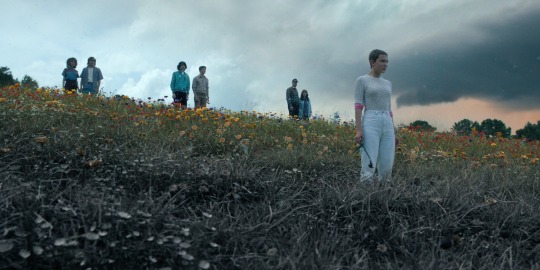
this has always given me the vibe of, 'there'll be petty arguments, drama, little crushes and lies, but when the world is ending, who do you grab despite all of it?'
jonathan and nancy grab each other. joyce and hopper grab each other. mike and will grab each other.
once again i want you to imagine you confessed your supposed love to your girlfriend, and then a week later the apocalypse starts. wouldn't you go to her?? stand by her??
mike didn't. he stuck with will. because mlvn just aren't that kind of relationship. but byler is that kind of relationship.
#stranger things#byler#will byers#mike wheeler#byler endgame#byler analysis#stranger things 4#mike wheeler i know what you are#milkvan bones#milkvan is bones#st analysis
180 notes
·
View notes
Text
I just think it'd be really poetic if Mike and Will were both using El as a cover during the van scene
#van scene#byler#st4 rewatch#byler analysis#st analysis#we know wil was using the milkvan relationship to talk about his own feelings for mike#but what if mike was also using the milkvan relationship to talk about his feeings for will?
239 notes
·
View notes
Text
Re-watching the fourth season, you can see back in the first episode, a very funny and interesting detail.
The scene takes place in the first 15 minutes of season 4 episode 1. Nancy yells at Mike for being late, then we get to the most interesting part. Karen starts talking about how Mike needs to finish their hellclub game earlier to get to bed at 9pm because his flight is at 6am.
There's some dialog going on.
Karen: No buts. Nine or no California
Ted: And no sweetie pie.
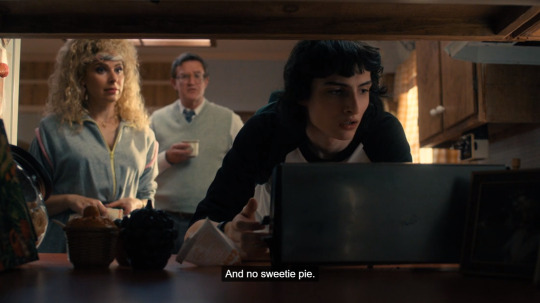
After Ted's words, Mike has a confused look on his face. But why? Mike knows his dad isn't talking about his girlfriend El.
We remember that Ted and Karen don't know about El because in season one the government people came and told the family to stay away from the girl. I don't think Mike, Lucas or Dustin's parents know about El.
So then who could Ted be talking about if it's not El? Will. He was talking about Will. In season one, Ted threw phrases like, "our son with a girl?" which makes it clear that Ted's making homophobic comments about his son and he's probably thinking about his son dating his friend.
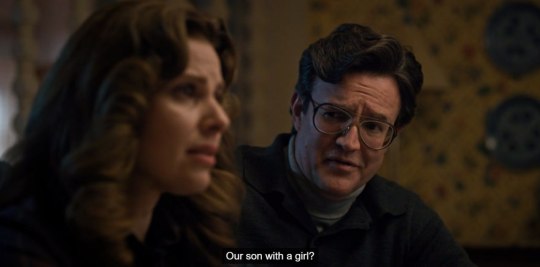
Also, the letters that come to Mike from Colifornia, the parents may think it's from Will, since they don't even know about Mike's girlfriend and only Will, in this case, in their eyes, sends Will to Mike in return.
+The pie is made mainly from fruit, but we remember what they call people who are gay.
I think this is another way of showing us that Byler exists and we didn't make it up.
#byler#byler endgame#mike wheeler#finn wolfhard#will byers#byler brainrot#noah schnapp#stranger things 3#stranger things 4#stranger things analysis#stranger things theory#stranger things#stranger things 5#st analysis#st5#st#byler s5#st5 leaks#byler is canon#byler analysis#byler is endgame#byler is real#byler nation#byler theory#byler 🏳️🌈#will x mike#mike we know who you are#gay mike wheeler#mike wheeler is gay#miwi
485 notes
·
View notes
Text
Why “Hiding in the Light” Didn’t Work: Stranger Things’ Psychospiritual Implications
Supplementary Sources: Jungian Theory & A Wrinkle In Time
Alright, buckle in. I’m running on a year’s worth of spiritual awakening, deep dives into Jungian theory and non-dualism, and my own ego’s primary coping mechanism: immersing myself in media as escapism. The purpose of this analysis is to break down the themes of non-dualism and light/darkness in ST (and maybe predict some character arcs), and also to position the narrative of ST as a psychospiritual wake-up call.
For some context: last year, I discovered the work of psychoanalyst (or philosopher, depending on who you’re talking to) Carl Jung. He had a pretty extensive theory about the human psyche that I immediately connected to the themes throughout Stranger Things, specifically Vecna’s mind control and curse. I’m going to break Jung’s theory down as succinctly as I can, and then delve into how it plays out in our favorite gay monster show.
But before I delve into Jung’s ideas, I also think it’s important to define selfhood (you’ll understand why in a minute). For the purposes of this analysis, the experience of the “self” is an illusion created by our senses, perceptions, memories, and consciousness, all of which are impermanent. Therefore, the self is what we call “conditioned.” There is no you or me, just the ideas we have of ourselves.
Now, we can get into Jung’s theory. He posited the following:
1. Every individual has a “persona” they show the world (a constructed self) to feel like they belong. Underneath this persona, everyone has a personal “shadow,” or the part of themselves they don’t want to acknowledge. This shadow is always projected onto others— every negative thought we have about someone else is a product of our own unintegrated shadow. Note: The shadow is NOT bad, it just “is.” It’s actually there to HELP us grow and integrate all the unhealed parts of us.
2. Individuals’ shadows are usually part of their unconscious, meaning most people are not aware of their shadow side or cannot bear to delve into their trauma/darkness and begin to heal it.
3. All of human consciousness is CONNECTED. This means two things. 1: There is a “collective unconsciousness” that contains the sum of all of our unintegrated trauma, and 2: We can heal our collective unconsciousness by healing our own unconsciousness.
How do we heal our own unconsciousness? By becoming AWARE of our shadow side, accepting and forgiving the conditioning that created it, and working to encourage others to do the same.
What— or rather, who— does that remind you of?
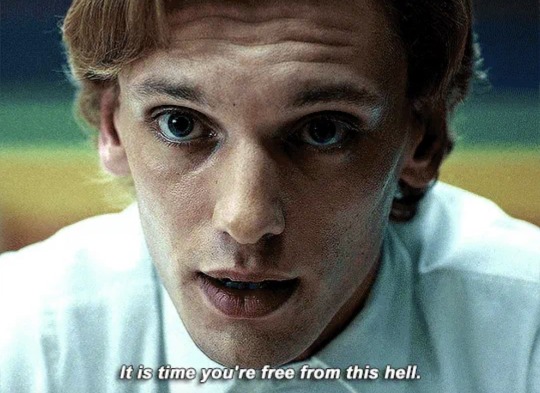
Also— great use of lighting here.
We know Vecna has direct access to his victims’ consciousness; not just their memories, cognition, and emotions, but also their awareness itself. This is how he’s able to target and trance people. But it’s not just their consciousness Vecna has access to; it’s their unconsciousness. Their shadow. Their trauma. Yes, he has psionic abilities akin to El’s, but as far as we know, El can’t access the collective unconsciousness like Vecna can. She is only capable of “remote viewing” via the void or piggybacking into people’s minds. So why is Vecna capable of this?
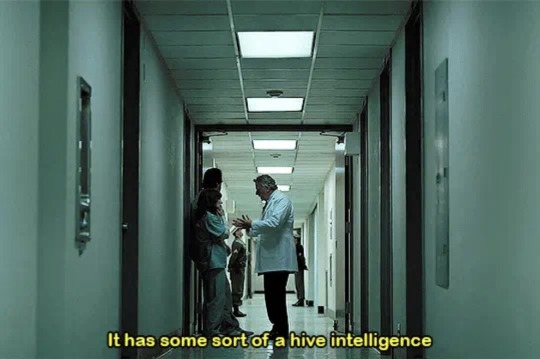
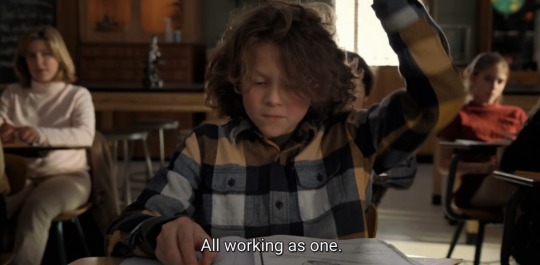
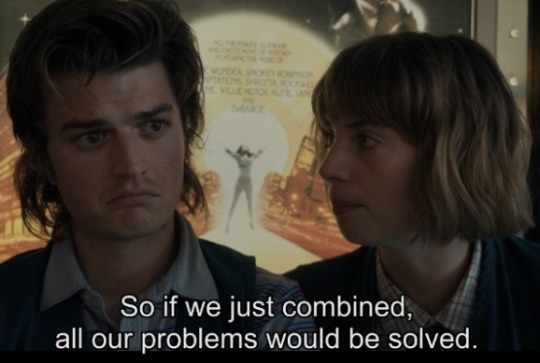
If you want my take on it: the only way to access a collective shadow would be through accessing your own shadow. So is Vecna really Henry, or his unintegrated shadow? And is either really condemnable, considering the larger themes of the show?
We see this theme of non-dualism echoed in Brenner’s NINA pep talk with El:
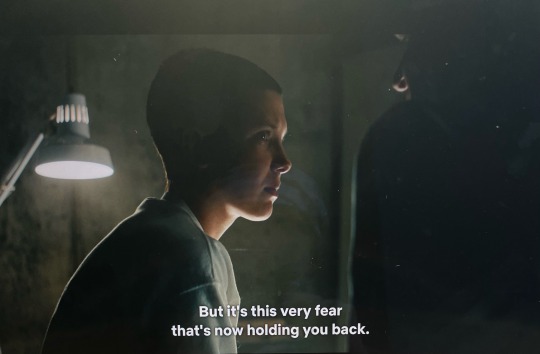
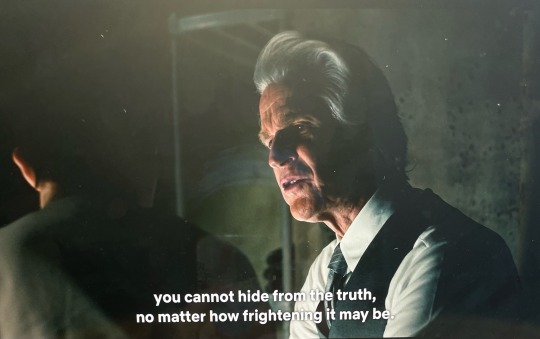
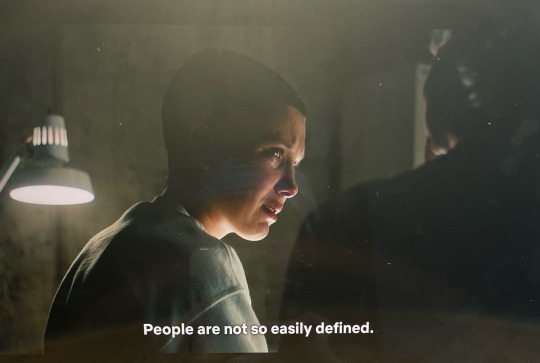
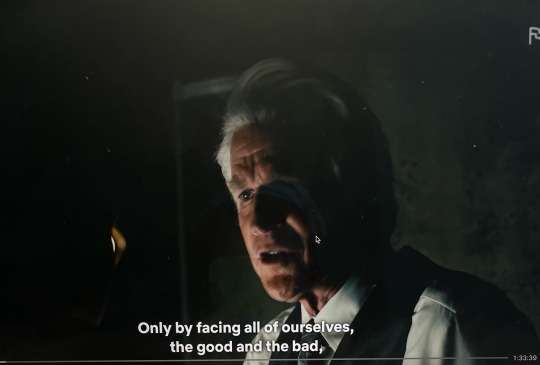
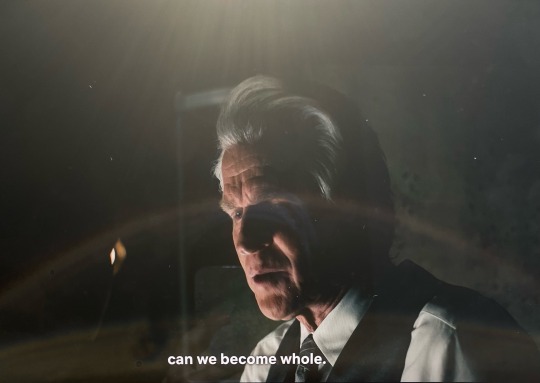
It’s fascinating to me that they’re communicating these bigger thematic ideas through the show’s “villians”— while the above conversation could be taken at surface-level as Brenner being manipulative, it’s important to acknowledge the truth of what he’s saying. NINA is only successful because El faces “the good and the bad.” This is why “hiding in the light” is a no-go for Max.
Focusing only on happy memories is a form of emotional bypassing. Throughout the show, we’ve been told time and again that hiding doesn’t work. Neither does running away. The only way out for our characters is through their own shadows.
Now, the fun part: predictions. Looking at all of this with a Jungian lens, it doesn’t make much sense to villianize a character or to end the story by “defeating evil.” In non-dual theory, there are no evil people, only unhealed ones.
We know what worked for our characters temporarily (Will in the UD, Max in her first trance, El using her powers against Vecna) was the memory and vibration of love.
This reminded me of A Wrinkle In Time, which is a science fiction novel that’s been noted more than a few times as one of Stranger Things’ primary influences. In the book, a girl and her brother travel through time to rescue their father from an alternate dimension where all beings are controlled in a hyper-individualist suburbia by a giant, all-knowing brain. The climactic “defeat” of the brain is shockingly simple, but incredible impactful— Meg, the heroine, tells it over and over that she loves it. This love ultimately brings her father and brother out of trances they are in, and they’re able to remember her and travel back home.
(Tangent: And God. The implications of that, outside of analyzing ST, are powerful. How do we live in a capitalist hellscape that is so caught up in the mind— in acheiving, obtaining, securing, protecting the ego— that many of us have forgotten our hearts? The answer is love. Loving ourselves more deeply to love all beings more deeply, “the good and the bad.” But love does not negate accountability, and it does not excuse harm.)
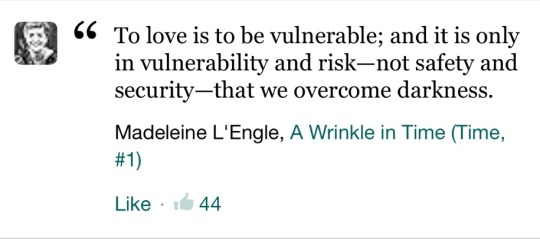
Our characters are all struggling with self-acceptance and self-love in some form or another. Each is wrestling with secrets and lies, and the desire to hide parts of themselves they think others can’t accept.
Mike is clearly struggling with self-loathing, guilt surrounding what happened to El in s1, and a crippling hero complex.
Will is also on the self-loathing train, continually self-sacrifices to his own detriment, and is hiding his identity out of fear (not at all villifying that, just for the record.)
El struggled to reconcile her abilities and forced weaponization with her identity outside of the lab pre-s4.
Max was suicidal and had a lot of self-hatred after B*lly’s death.
Nancy parallels Mike in her survivor’s guilt post-s1 and exhibits the same lack of self-preservation and self-sacrificing tendencies.
You get my point. So how will these characters overcome their trauma? Not through hiding, or running, or bypassing. Not through the light alone. Through love— acknowledgement of their own darkness, compassion for the unhealed nature of others, and commitment to being honest with themselves and their loved ones. We know Will is El and Henry’s mirror/foil and will play a central role in S5, and with all of this in mind I think it’s safe to say he will break the cycle of bypassing and hiding from trauma and pain once and for all. He won’t fight it like El, hide from it like Max, or run from it like he did as a kid.
Only by integrating their shadows can our characters become truly “themselves,” or as Brenner puts it, “whole.”
I will probably have much more to say about this after my re-read of A Wrinkle in Time, but for now, that’s all I’ve got. :) Hope everyone is doing well!
#i dont normally do posts like this but my brain has been whirring lately#stranger things#byler#mike wheeler#will byers#vecna#henry creel#st5 speculation#st analysis#stranger things analysis
205 notes
·
View notes
Text






we might know who bradley is, but who the hell is uncle jack?
#stranger things#st analysis#st parallels#max mayfield#robin buckley#murray bauman#erica sinclair#st5 production#st5 speculation
99 notes
·
View notes